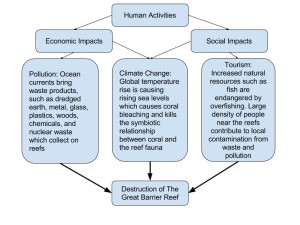- In 200-250 words, choose a specific hotspot around the world and describe the biodiversity in the area. Then outline dangers humans have imposed on this hotspot.
The hotspot I have chosen to focus on is the Great Barrier Reef. The Great Barrier Reef is the world’s largest coral reef system, comprised of over 400 different types of coral, 1,500 species of fish, and over 4,000 species of mollusk. The Great Barrier Reef spans over 1,400 miles along the cost of Queensland, Australia; it is a structure so large, it can be viewed from outer space. The reef contains extremely unique biodiversity, where completely different ecosystems exist along the depth of the reef, laterally out into the ocean, and along the length of the coastline. Similarly, to a tree in the Amazon, a single coral reef system may house hundreds of different animal species. The biodiversity is in great danger, due to many different human influences. Climate change is the GBR’s greatest threat, where sea temperature rise causes coral reef bleaching. This phenomenon occurs when temperature limits are exceeded, and corals expel the algae that live inside them. The symbiotic relationship between algae is destroyed when bleaching occurs, and the plants and animals that rely on the algae for nutrition do not survive.
- Create a systems diagram relating the general impacts humans have on biodiversity around the world.
The systems diagram outlines the impacts that human beings have on the destruction of the Great Barrier Reef. Economic activities such as fishing, infrastructure development, technological development and production all produce different types of wastes and pollutants. Humans may bury these wastes in the ground, keep them in landfills, or may directly dump them in the ocean. These wastes inevitably make it into our waters, where currents transport them all over the planet. Subsequently, wastes are deposited on the Great Barrier Reef which directly damages both flora and fauna occupying the reef. Social activities such as tourism bring significant attraction to places like the GBR. Although tourism might spread awareness about the damages being done to the GBR, it is also directly damaging the reef itself. Large numbers of people visiting the reefs may disrupt local ecosystems, and trash produced by the tourism ends up collecting in the reef, and destroys it. Lastly, climate change is a result of both social and economic activities, where human activities all over the world is causing temperature rises, which in turn, causes sea temperatures to rise. This disrupts the coral reef systems, for example coral bleaching, which directly damages the reefs.
- Include something from current events, or your own life, or something else that deeply matters to you.
I absolutely love to travel. If it were possible, I would definitely be traveling for the rest of my life. I love visiting new places, completely different from New York where I am from, and experiencing all of the different aspects of the environments that I am in. I absolutely love hiking, and exploring, and seeing all the different animals that inhabit these different areas. The world has absolutely amazing biodiversity, most of which many people are not able to experience at all throughout their lives. For me personally, I would love to be able to travel and experience as much of the biodiversity in these different areas as I possibly can. For all we know, Earth may contain all of the biodiversity in the entire universe, and most people stay in one place and do not even attempt to experience it, and unfortunately, actively destroy it. That being said, I believe preserving our biome, the Earth, is one of the most important things humanity can achieve. Like I said, the Earth may be one of a kind in the entire universe, and we need to preserve it so we can enjoy it hopefully forever. At least in our own anthropocentric ideology, without the Earth and the conscience beings inhabiting it, the Earth and the universe would be utterly pointless.


Hi I’m Katie and my blog post can be found here: http://geog030.dutton.psu.edu/2016/04/15/own-activity-module-10-katie-greiner/
You post caught my attention because you talked about the Great Barrier Reef in Australia. I am traveling there next spring and I was planning on seeing the GBR, but now your post makes me a little bit apprehensive about going! I do like how you included the negative and positive aspects of humans knowing more knowledge about what is happening to the GBR. I also enjoyed how you tied your passion for traveling into helping to create more biodiversity on the planet. Great post!
Hi I’m Jess and here is my blog post: http://geog030.dutton.psu.edu/2016/04/15/bp-oil-spill-biodiversity/. I like your systems diagram about the impacts of humans. I talked about how the BP oil spill caused so much damage to biodiversity. It’s a shame that people don’t realize how much of an impact we have on the environment. Specifically, my diagram relates to yours in the pollution category. The spill caused so much pollution because of the amount of oil that spilled into the ocean for over 3 months.